人教版七年级上册英语知识点全第六单元unit6知识点
人教版七年级英语上册Unit6短语、句型、知识点总结知识分享
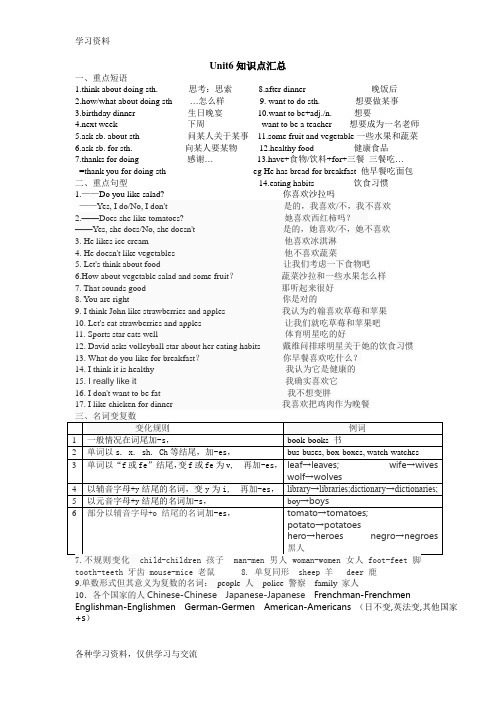
7.That sounds good那听起来很好
8.You are right你是对的
9. I think John like strawberries and apples我认为约翰喜欢草莓和苹果
10. Let's eat strawberries and apples让我们就吃草莓和苹果吧
11. Sports star eats well体育明星吃的好
12. David asks volleyball star about her eating habits戴维问排球明星关于她的饮食习惯
13.What do吃什么?
14.I think it is healthy我认为它是健康的
15.I really like it我确实喜欢它
16.I don't want to be fat我不想变胖
17. I like chicken for dinner我喜欢把鸡肉作为晚餐
三、名词变复数
变化规则
例词
1
一般情况在词尾加-s,
2.——Does she like tomatoes?她喜欢西红柿吗?
——Yes, she does/No, she doesn't是的,她喜欢/不,她不喜欢
3. He likes ice cream他喜欢冰淇淋
4. He doesn't like vegetables他不喜欢蔬菜
5. Let's think about food让我们考虑一下食物吧
library→libraries;dictionary→dictionaries;
2019-2020人教版七年级英语上册unit 6期末基础知识点复习和训练(含答案)

2019-2020人教版七年级英语上册Uni t 6期末基础知识点复习及训练(含答案)Unit6 Do you like bananas?一、基础知识点及句型复习1、like v.喜欢;想要;愿意(1)跟名词或代词宾格作宾语,即like sb/sth.(2)跟动名词作宾语,即like doing sth.(3)跟不定式作宾语,即like to do sth.注意:like to do表示一次性或尚未发生的动作;like doing表示习惯性的动作或爱好。
类似用法的单词还有:love, hate.2、---Do you like banana?---Yes, I do.like为实义动词,意为“喜欢,喜好”。
构成肯定句时,若主语不是第三人称单数,直接用like作谓语;若主语是第三人称单数,则用likes。
在变为否定句或疑问句时,要借助助动词do或does,动词like用原形。
3、some一些,若干(1)adj. 既可以修饰可数名词的复数,也可以修饰不可数名词。
(2)pron. 代词(3)可以用在表示邀请、请求或期望得到肯定回答的疑问句中。
5.wantWant作动词,意为“想,想要”,其用法如下:+名词,想要某物:He wants a pen.Want +to do sth想要做某事:I want to be a teacher.+sb.to do sth想要某人做某事:He wants me to help him.5、breakfast n.早餐,早饭(1)表示吃早餐,通常用have,有时可以用eat或take.(2)三餐前一般不加冠词a/an/theAfter breakfast, I go to school.(3)如果在表示三餐的名词前加上形容词或形容词性的词时,前面要加不定冠词。
例:He had a big lunch.(4)like…… for breakfast/lunch/dinner.have……某餐喜欢吃……例1、 She likes eggs, bananas and apples for lunch.=例2、For lunch ,she likes eggs, bananas and apples.5、ask(1)ask v. 询问:ask sb about sth就某事询问某人。
人教版英语七年级上册Unit6知识点总结
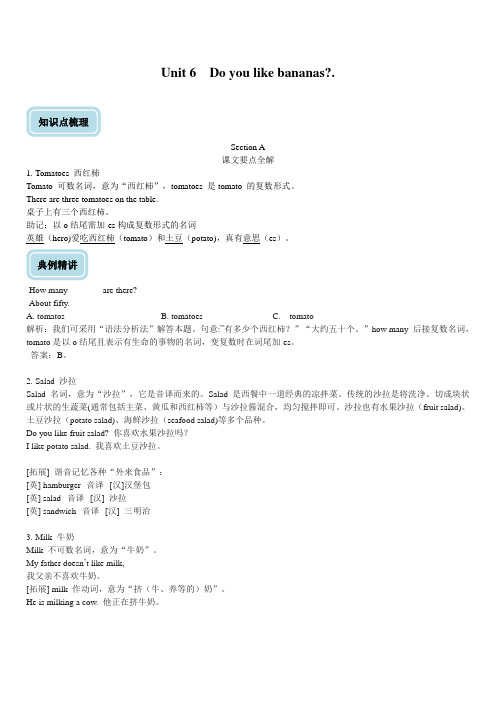
Unit 6 Do you like bananas?.知识点梳理Section A课文要点全解1.Tomatoes 西红柿Tomato 可数名词,意为“西红柿”,tomatoes 是tomato 的复数形式。
There are three tomatoes on the table.桌子上有三个西红柿。
助记:以o结尾需加-es构成复数形式的名词英雄(hero)爱吃西红柿(tomato)和土豆(potato),真有意思(es)。
典例精讲-How many________are there?-About fifty.A.tomatosB. tomatoesC. tomato解析:我们可采用“语法分析法”解答本题。
句意:”有多少个西红柿?”“大约五十个。
”how many 后接复数名词,tomato是以o结尾且表示有生命的事物的名词,变复数时在词尾加-es。
答案:B。
2.Salad 沙拉Salad 名词,意为“沙拉”,它是音译而来的。
Salad 是西餐中一道经典的凉拌菜。
传统的沙拉是将洗净、切成块状或片状的生蔬菜(通常包括主菜、黄瓜和西红柿等)与沙拉酱混合,均匀搅拌即可。
沙拉也有水果沙拉(fruit salad)、土豆沙拉(potato salad)、海鲜沙拉(seafood salad)等多个品种。
Do you like fruit salad? 你喜欢水果沙拉吗?I like potato salad. 我喜欢土豆沙拉。
[拓展] 谐音记忆各种“外来食品”:[英] hamburger--音译--[汉]汉堡包[英] salad--音译--[汉] 沙拉[英] sandwich--音译--[汉] 三明治k 牛奶Milk 不可数名词,意为“牛奶”。
My father doesn’t like milk,我父亲不喜欢牛奶。
[拓展] milk 作动词,意为“挤(牛、养等的)奶”。
He is milking a cow. 他正在挤牛奶。
人教版七年级英语上册 Unit 6 知识归纳(含答案)
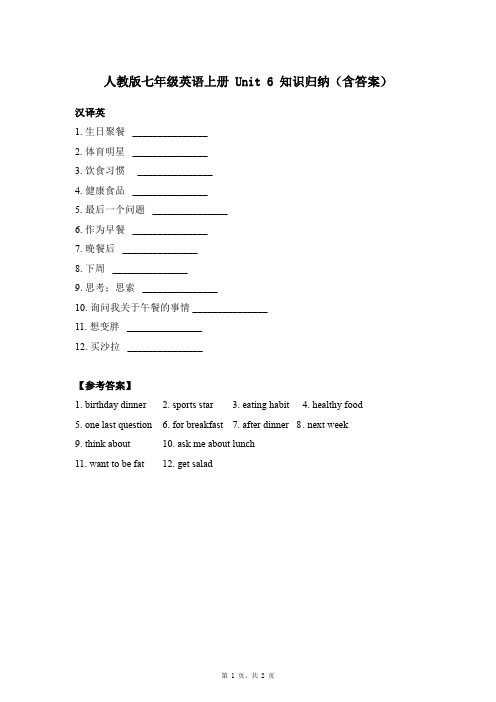
人教版七年级英语上册 Unit 6 知识归纳(含答案)汉译英1.生日聚餐_______________2.体育明星_______________3.饮食习惯_______________4.健康食品_______________5.最后一个问题_______________6.作为早餐_______________7.晚餐后_______________8.下周_______________9.思考;思索_______________10.询问我关于午餐的事情_______________11.想变胖_______________12.买沙拉_______________【参考答案】1. birthday dinner2. sports star3. eating habit4. healthy food5. one last question6. for breakfast7. after dinner8. next week9. think about10. ask me about lunch11. want to be fat12. get salad汉译英1. Cindy认为她妹妹喜欢冰激凌。
____________________________________ 2.那么咱们喝牛奶吧!____________________________________ 3. Jack喜欢什么蔬菜?____________________________________ 4.——咱们早饭吃什么?——水果沙拉怎么样?____________________________________ ____________________________________ 5.——Tom喜欢梨吗?——不,他不喜欢。
____________________________________ ____________________________________ 6.——你们午饭后吃草莓吗?——是的,我们吃。
Unit+6+知识点归纳 人教版英语七年级上册

Unit 6◆短语归纳1.看电视watch TV2.看报纸read a newspaper =read newspapers3.明天的报纸tomorrow’s newspapers=the newspaper tomorrow4.与某人通过电话交谈talk to sb. on the phone5.听音乐listen to music6.使用电脑学习use the computer to learn7.用A去做B(3)use A to do B =use A for (doing) B =do B with Ae.g. 我们可以用笔写。
We can use pens to write. =We can use pens for writing.=We can write with pens.8.一本有用的书 a useful book9.听一张唱片listen to a CD.10.学习英语learn\study English11.学习弹钢琴learn to play the piano12.研究科学study science13.做汤make soup=cook soup14.喝汤eat\have soup (不用drink)15.洗餐具wash\do the dishes16.洗衣服wash some clothes \ do some washing17.去购物go shopping \去游泳go swimming \去跳舞go dancing18.购物do some\the shopping19.去看电影go to the movies=go to the cinema=go to see a film20.出去吃饭eat out21.没什么not much =nothing much22.和某人一起做某事join sb. for sth.和我们一起吃晚饭join us for dinner23.沏茶make tea \ 喝茶drink tea24.我很乐意(接受邀请)I’d love to=I’d like to25.我愿意做某事I’d love / like to do sth.26.在游泳池里游泳swim in the swimming pool27.赛车 a car race (race—速度型比赛)28.篮球比赛 a basketball game (game---竞技型、技术型比赛)29.在电视上看龙舟比赛watch the boat races on TV30.与她的祖父母生活\居住在一起live with her grandparents31.包粽子make zongzi32.给她的小孩读故事read a story to her young child33.备考\为考试学习study for the test34.寄宿家庭host family35.端午节the Dragon Boat Festival36.儿童节Children’s Day37.任意一个晚上any other night (any other+可数名词单数)38.任何一个男孩any other boy (any other+可数名词单数)39.想念他的家人miss his family40.错过校车miss the school bus41.错过看那场球赛miss watching that soccer game42.希望做某事wish to do sth. =hope to do sth.43.希望(某人)做某事wish (sb) to do sth (hope×)44.送给你最好的祝福best wishes to you45.打扫客厅clean the living room46.许多男老师many men teachers47.两名男学生two boy students◆句型归纳1.你在做什么?—What are you doing?我在看电视。
最新人教版七年级上册英语知识点全第六单元unit6知识点.docx
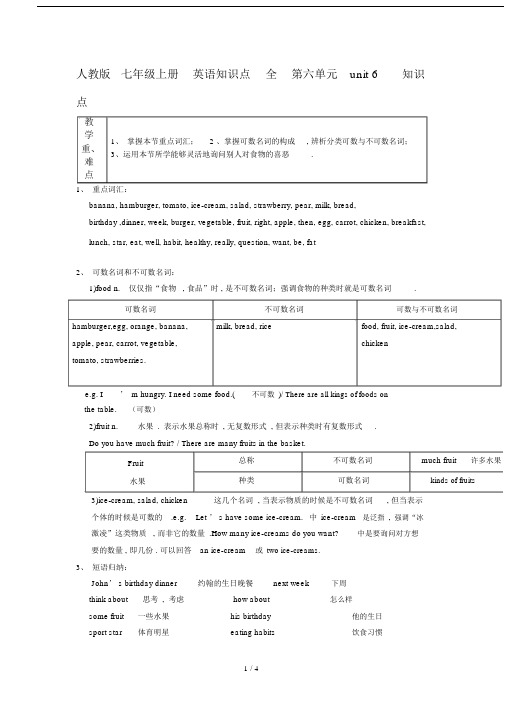
人教版七年级上册英语知识点全第六单元unit 6知识点教学重、难点1、掌握本节重点词汇; 2 、掌握可数名词的构成, 辨析分类可数与不可数名词;3、运用本节所学能够灵活地询问别人对食物的喜恶.1、重点词汇:banana, hamburger, tomato, ice-cream, salad, strawberry, pear, milk, bread,birthday ,dinner, week, burger, vegetable, fruit, right, apple, then, egg, carrot, chicken, breakfast,lunch, star, eat, well, habit, healthy, really, question, want, be, fat2、可数名词和不可数名词:1)food n.仅仅指“食物, 食品”时 , 是不可数名词;强调食物的种类时就是可数名词.可数名词不可数名词可数与不可数名词hamburger,egg, orange, banana,milk, bread, rice food, fruit, ice-cream,salad, apple, pear, carrot, vegetable,chickentomato, strawberries.e.g. I’ m hungry. I need some food.(不可数)/ There are all kings of foods onthe table.(可数)2)fruit n.水果.表示水果总称时, 无复数形式 , 但表示种类时有复数形式.Do you have much fruit? / There are many fruits in the basket.Fruit水果3)ice-cream, salad, chicken总称不可数名词much fruit许多水果种类可数名词kinds of fruits这几个名词 , 当表示物质的时候是不可数名词, 但当表示个体的时候是可数的.e.g. Let ’ s have some ice-cream.中ice-cream是泛指,强调“冰激凌”这类物质, 而非它的数量 .How many ice-creams do you want?中是要询问对方想要的数量 , 即几份 . 可以回答an ice-cream或two ice-creams.3、短语归纳:John’ s birthday dinner约翰的生日晚餐next week下周think about思考,考虑how about怎么样some fruit一些水果his birthday他的生日sport star体育明星eating habits饮食习惯for breakfast作早餐for dinner作晚餐one last question最后一个healthy food健康的食品3、 tomato可数n.“西柿”复数形式:tomatoes似的以o 尾的名 , 需加– es 构成复数形式的有potato, hero 但 photo 等而是以加—s 构成复数形式的.可以:有生命的名, 复数尾加-es,e.g. potato,hero;无生命的尾加-s,e.g. photo.4、某人的喜好, 通常用一般疑句:Do/does +主+ like +⋯?句型.肯定回答用: Yes, 主 + do/does.否定回答用: No, 主 + don ’ t /doesn’ t.(其中,do/does助).----Do you like the sweater ?----Yes, I do.----Does he like the pen ?----No, he doesn’ t.5、 Do you like bananas?1)bananas是banana的复数形式,表示一事物;在英中, 常用复数形式表示一事物 , 其前不用定冠the.2)like sb./sth.喜某人或某物 e.g. I like this ruler?/I like them.like to do sth.喜做某事(表示一次性的或不常的喜) e.g. She likes to play with her little sister.like doing sth.喜做某事(常性的喜) e.g. He likes playing the guitar.5、 Hey, John ’ s birthday dinner is next week翰的生日宴会在下周.1)John’ s birthday dinner翰的生日宴会.John ’s 是名所有格形式, 用于表示所属关系 .e.g. This is Jim’ s sister./It is Tom’s pen.2)next week下周e.g. Teacher’ s Day is next week.6、 think about考e.g. Let’ s think about the eggs./ Let’ s think about the food.7、 Howabout ⋯?====What about ⋯ ?⋯⋯怎么?, 用于提出建或求. 其中 about 是介, 后接 n./ pron./v-ing.e.g. How about him? / How about having some bread?展:英中常用于提建的句型有:1)Let’ s⋯ .我⋯⋯吧. e.g. Let’ s have some apples.2) Why not⋯?什么不⋯⋯呢? e.g. Why not ask our teacher?8、some “一些” , 用于修饰可数名词, 也可用来修饰不可数名词 . 一般用于肯定句中 . 但当表示建议或请求 , 并希望对方给予肯定回答时 , 句中也用 some, 而不用 any.any 一般用于否定句疑问句中.e.g. I have some apples./He has some milk./Would you like some orange juice?I don’t have any pears./Do you have any milk?9、 Let ’ s have strawberries and apples then.1)strawberries是可数名词strawberry的复数形式,其变化是将词尾y 变为 I, 再加 es.2)have v. “有 , 吃、喝” . 英语中 , 习惯上用have breakfast/lunch/supper/dinner来表示吃早饭、午饭、晚饭. 表示吃具体食物时, 可与 eat 替换 .e.g. Let’ s have /eat some apples.10、 so 连词 , “因此 , 所以”不可与because 同时出现在一个句子中 .e.g. I’ m ill today, so I can’t go to school.11、 well adv“好” , 在课文中是修饰动词eat.】辨析 well和 good两者都意为“好” ,但其用法不同 .形容词放在连系动词后 , 表达“健康的”意思I ’ m very well.我很好 .well副词修饰动词We eat well. 我们吃的很好 .good形容词放在名词前作定语 , 或放在连系动词后She is a good girl.作表语12、 for prep.“为 , 替 , 给”可以表示用途、对象、目的、愿望, 等 .e.g. Let’s get a new light for the bedroom./ let’s go out for a walk./Good luck for you.( )Mary often has eggs and bread _____breakfast.A. with B. for C. on13、 really adv.“事实上 , 真正地” , 用于加强语气 , 表示程度 , 放在动词前 .real adj. “真的”e.g. I really don’ t know./Hi, Joe, is it really you?That is not her real name.14、 after dinner用餐后dinner n.“正餐 , 晚餐”常用来表示一天中的正餐( main meal ) , 英语国家晚餐一般是一天中最丰富的一餐, 因此 dinner常用来指晚餐 . 而 supper 只指晚餐 . 此外 ,dinner 一词比较正式 , 邀请朋友赴宴常用它 .e.g. We ’ ll have dinner together in the evening.15、 want v.“想”1 ) want sth.想要某物 e.g. I want an apple.2)want to do sth.想要去做某事 e.g. I want to eat an apple.3)want sb. to do sth.想要某人做某事 e.g. I want you to help me.。
Unit6讲义人教版英语七年级上册
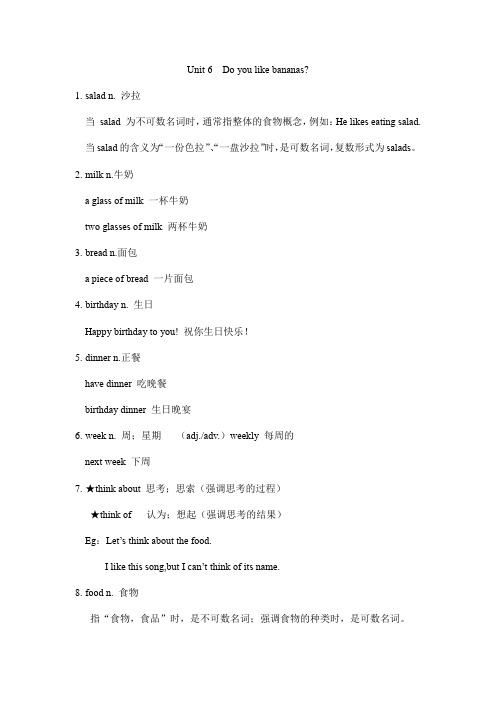
Unit 6 Do you like bananas?1.salad n. 沙拉当salad 为不可数名词时,通常指整体的食物概念,例如:He likes eating salad.“一盘沙拉”时,是可数名词,复数形式为salads。
当salad的含义为“一份色拉”、k n.牛奶a glass of milk 一杯牛奶two glasses of milk 两杯牛奶3.bread n.面包a piece of bread 一片面包4.birthday n. 生日Happy birthday to you! 祝你生日快乐!5.dinner n.正餐have dinner 吃晚餐birthday dinner 生日晚宴6.week n. 周;星期(adj./adv.)weekly 每周的next week 下周7.★think about 思考;思索(强调思考的过程)★think of 认为;想起(强调思考的结果)Eg:Let’s think about the food.I like this song,but I can’t think of its name.8.food n. 食物指“食物,食品”时,是不可数名词;强调食物的种类时,是可数名词。
9.right adj. 正确的;—(反义词)wrong 错误的adj. 右边的;—(反义词)left 左边的★All right!用作对方建议或劝告的应答语。
Eg:—Let’s go and ask him.让我们去问他。
—All right. 好的。
10.star n. 星星;明星a volleyball star 一个排球明星11.eat v. 吃★eating habits 饮食习惯12.well adv. 好;令人满意地(adj.)good 好的Eg:Sports Star Eats Well.I have good eating habits.13.question n. 问题one last qusetion 最后一个问题14.healthy adj. 健康的(n.)health 健康★keep healthy 保持健康15.want v. 想要want sth. 想要某物want to do sth. 想要做某事want sb. to do sth. 想要某人做某事Eg:I don’t want to be fat.16.—What do you like for breakfast?—I like ........【语法】名词的单复数有些名词既可作可数名词又可作不可数名词,但意义不同,要注意区分.①glass cn.杯子un.玻璃orange cn橘子un.橘汁①还有表示动物类的名词,表示动物时是可数名词,表示为菜肴时是不可数名词. chicken cn.小鸡un.鸡肉fish cn鱼un鱼肉①salad, icecream, food, fruit 作总称讲是不可数名词,作种类讲是可数名词【即学即练】一、请写出下列词的复数形式city _____ _zoo ______country _____ tooth ____mouse _________ boy____________ broom ___________car ____tree ______horse ______ bus______________ fox _____branch ____ baby _____ family _____ dish _____radio _____ photo _____ piano _____ knife _____leaf _____ life _____ thief _____ _man _____woman _____ child ___ foot______this _____________ watch___________ diary____________ day____________ book____________dress____________ sheep___________ tea_____________ box___________ strawberry_________ peach__________ sandwich__________ paper_________ juice__________ water____________ milk___________ rice__________people ______CD________ ox___________deer____________ fish___________二、选择填空.( )1. They e from different ______A. countryB. countriesC. a countryD. countrys( )2. How many ______ do you see in the picture?A. tomatosB. tomatoesC. tomatoD. the tomato( )3. They are______.A . woman teachers B. women teachersC. women teacherD. woman teacher( )4. Would you like _______ ,please?A. two glass of waterB. two glasses of waterC. two glass of watersD. two glasses of waters( )5. Most of ______ live in _______.A. Germans, GermanB. German, GermenC. Germen, GermanyD. Germans, Germany( )6. There are some ______ in these _______.A. knifes pencilboxesB. knives pencilsboxC. knives pencilboxD. knives pencilsboxes( )7. ______ like ______ by air.A. Greens, travellingB. The Green, travelingC. The Greens, travelD. The Greens, traveling( )8. I wonder why ______ are interested in action films(武打片).A. the peopleB. peopleC. peoplesD. the peoples( )9. There is no ______ in the plate.A. applesB. orangesC. riceD. eggs( )10.My uncle has three _______.A.childB.childsC.childrenD.childrens四.填入所给名词的正确形式。
人教版七年级上册英语 Unit 6 Do you like bananas 知识点总结
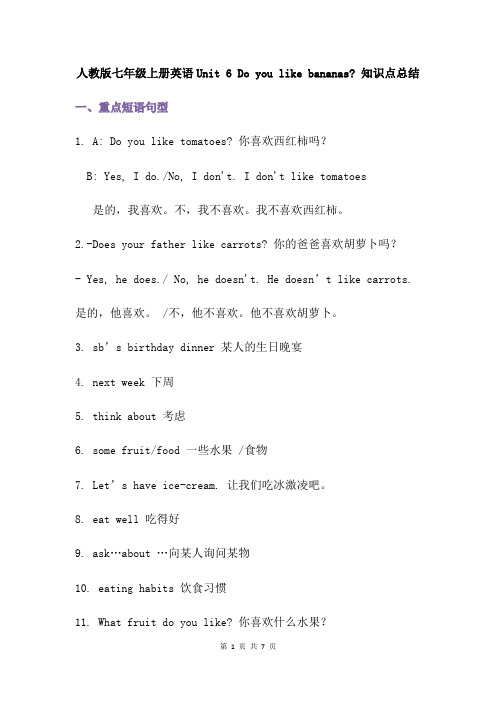
人教版七年级上册英语Unit 6 Do you like bananas? 知识点总结1. A: Do you like tomatoes? 你喜欢西红柿吗?B: Yes, I do./No, I don't. I don't like tomatoes 是的,我喜欢。
不,我不喜欢。
我不喜欢西红柿。
2.-Does your father like carrots? 你的爸爸喜欢胡萝卜吗?- Yes, he does./ No, he doesn't. He doesn’t like carrots. 是的,他喜欢。
/不,他不喜欢。
他不喜欢胡萝卜。
3. sb’s birthday dinner 某人的生日晚宴4. next week 下周5. think about 考虑6. some fruit/food 一些水果 /食物7. Let’s have ice-cream. 让我们吃冰激凌吧。
8. eat well 吃得好9. ask…about …向某人询问某物10. eating habits 饮食习惯11. What fruit do you like? 你喜欢什么水果?12. for breakfast/lunch/dinner 就早 /午/晚餐而言13. It’s healthy. 它是健康的。
14. I really like it. 我真的喜欢它。
15. I like chicken for dinner. 晚餐我喜欢吃鸡肉。
16. one last question 最后一个问题17. after dinner 晚饭后18. I don’t want to be fat. 我不想变胖。
1、Do you like hamburgers? 你喜欢汉堡包吗?Yes, I do. No, I don’t是的,我喜欢。
/ 不,我不喜欢。
2、I like French fries. 我喜欢在薯条。
- 1、下载文档前请自行甄别文档内容的完整性,平台不提供额外的编辑、内容补充、找答案等附加服务。
- 2、"仅部分预览"的文档,不可在线预览部分如存在完整性等问题,可反馈申请退款(可完整预览的文档不适用该条件!)。
- 3、如文档侵犯您的权益,请联系客服反馈,我们会尽快为您处理(人工客服工作时间:9:00-18:30)。
人教版七年级上册英语知识点全第六单元unit6知识点Unit6谈论对食物的喜恶;
1、重点词汇:
banana,hamburger,tomato,ice-
cream,alad,trawberry,pear,milk,bread,birthday,dinner,week,burger ,vegetable,fruit,right,apple,then,egg,carrot,chicken,breakfat,lu nch,tar,eat,well,habit,healthy,really,quetion,want,be,fat
2、可数名词和不可数名词:
1)foodn.仅仅指“食物,食品”时,是不可数名词;强调食物的种类时就是可数名词。
e.g.I’mhungry.Ineedomefood.(不可
数)/Thereareallkingoffoodonthetable.(可数)
2)fruitn.水果。
表示水果总称时,无复数形式,但表示种类时有复数形式。
Doyouhavemuchfruit/Therearemanyfruitinthebaket.
3)ice-cream,alad,chicken这几个名词,当表示物质的时候是不可数名词,但当表示个体的时候是可数的。
e.g.Let’haveomeice-cream.中ice-cream是泛指,强调“冰激凌”这类物质,而非它的数量。
Howmanyice-creamdoyouwant中是要询问对方想要的数量,即几份。
可以回答anice-cream或twoice-cream.
3、短语归纳:
John’birthdaydinner约翰的生日晚餐ne某tweek下周
thinkabout思考,考虑howabout怎么样
omefruit一些水果hibirthday他的生日
porttar体育明星eatinghabit饮食习惯
forbreakfat作为早餐fordinner作为晚餐
onelatquetion最后一个问题healthyfood健康的食品
3、tomato可数n.“西红柿”复数形式:tomatoe
人教版七上2022知识点总结全
类似的以o结尾的名词,需加–e构成复数形式的单词还有
potato,hero但photo等词而是以加—构成复数形式的。
可以这样记:有生命的名词,变复数词尾加-e,e.g.potato,hero;无生命的词尾加-,e.g.photo.
4、询问某人的喜好,通常用一般疑问句:Do/doe+主语+like+句型。
肯定回答用:Ye,主语+do/doe.
否定回答用:No,主语+don’t/doen’t。
(其中,do/doe为助动词)。
----Doyouliketheweater
----Ye,Ido.
----Doehelikethepen
----No,hedoen’t.
5、Doyoulikebanana
2)likeb./th.喜欢某人或某物e.g.Ilikethiruler/Ilikethem.
liketodoth.喜欢做某事(表示一次性的或不经常的喜欢)
e.g.Sheliketoplaywithherlittleiter.
likedoingth.喜欢做某事(经常性的喜欢)
e.g.Helikeplayingtheguitar.
5、Hey,John’birthdaydinnerine某tweek约翰的生日宴会在下周。
1)John’birthdaydinner约翰的生日宴会。
John’是名词所有格形式,用于表示所属关系。
e.g.ThiiJim’iter./ItiTom’pen.
2)ne某tweek下周
e.g.Teacher’Dayine某tweek.
6、thinkabout考虑
e.g.Let’thinkabouttheegg./Let’thinkaboutthefood.
7、Howabout====Whatabout怎么样?,用于提出建议或请求。
其中about是介词,后接n./pron./v-ing.
e.g.Howabouthim/Howabouthavingomebread
扩展:英语中常用于提建议的句型还有:
1)Let’.让我们吧。
e.g.Let’haveomeapple.
2)Whynot为什么不呢?e.g.Whynotakourteacher
8、ome“一些”,用于修饰可数名词,也可用来修饰不可数名词。
一
般用于肯定句中。
但当表示建议或请求,并希望对方给予肯定回答时,句
中也用ome,而不用any.
any一般用于否定句疑问句中。
人教版七上2022知识点总结全
e.g.Ihaveomeapple./Hehaomemilk./WouldyoulikeomeorangejuiceId on’thaveanypear./Doyouhaveanymilk
9、Let’havetrawberrieandapplethen.
1)trawberrie是可数名词trawberry的复数形式,其变化是将词尾y
变为I,再加e.
2)havev.“有,吃、喝”。
英语中,习惯上用
havebreakfat/lunch/upper/dinner
来表示吃早饭、午饭、晚饭.表示吃具体食物时,可与eat替换。
e.g.Let’have/eatomeapple.
10、o连词,“因此,所以”不可与becaue同时出现在一个句子中。
e.g.I’milltoday,oIcan’tgotochool.
11、welladv“好”,在课文中是修饰动词eat.
】辨析well和good
两者都意为“好”,但其用法不同。
12、forprep.“为,替,给”可以表示用途、对象、目的、愿望,等。
e.g.Let’getanewlightforthebedroom./let’gooutforawalk./Good luckforyou.
()Maryoftenhaeggandbread_____breakfat.
A.withB.forC.on
13、reallyadv.“事实上,真正地”,用于加强语气,表示程度,放在动词前。
realadj.“真的”
e.g.Ireallydon’tknow./Hi,Joe,iitreallyyo u
Thatinotherrealname.
14、afterdinner用餐后
dinnern.“正餐,晚餐”常用来表示一天中的正餐(mainmeal),英语国家晚餐一般
是一天中最丰富的一餐,因此dinner常用来指晚餐。
而upper只指晚餐。
此外,dinner一词比较正式,邀请朋友赴宴常用它。
e.g.We’llhavedinnertogetherintheevening.
15、wantv.“想”
1)wantth.想要某物e.g.Iwantanapple.
2)wanttodoth.想要去做某事e.g.Iwanttoeatanapple.
3)wantb.todoth.想要某人做某事e.g.Iwantyoutohelpme.。
